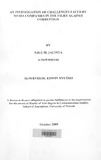| dc.contributor.author | Njue, Jacinta M | |
| dc.date.accessioned | 2013-05-07T08:48:06Z | |
| dc.date.available | 2013-05-07T08:48:06Z | |
| dc.date.issued | 2009-10 | |
| dc.identifier.citation | Masters of Arts Degree in Communication Studies | en |
| dc.identifier.uri | http://erepository.uonbi.ac.ke:8080/xmlui/handle/123456789/19654 | |
| dc.description | A Research Report submitted in partial fulfillment of the requirement for the award of Master of Arts Degree in Communication studies,School of Journalism, University of Nairobi | en |
| dc.description.abstract | The objectives of the study were to establish the role of the Kenyan media in the fight
against corruption; investigate and establish the factors influencing media coverage of
corruption; investigate and understand the challenges faced by the Kenyan media in the
fight against corruption; establish the strengths and weaknesses of the Kenyan media in the fight against corruption; and to recommend strategies for strengthening the Kenyan media to effectively fight corruption. An exploratory research design which involved carrying out a survey of mainstream media houses in Kenya was undertaken. The population of study consisted of reporters and editors in the media industry. A purposive sampling procedure was used in selecting 50 reporters from mainstream media houses.Out of the targeted 50 respondents, nineteen were positive representing a response rate of 38 percent.The study established that there was no relationship between age of the firm and the number of investigative journalists it employs. However, it was found that ownership status influenced geographic coverage of media firms. Firms which were both foreign and locally owned operated internationally while half of firms which were purely locally owned operated regionally. All (l00 percent) media firms did not have corruption reporting departments but, covered corruption stories every week. Out of the total number of journalists employed by 68 percent of media firms, less than 10 percent were specialized in covering corruption stories. Reporting corruption was identified as the largest contribution by the media firms towards fighting the crime. Investigation, whistle blowing and agenda setting in that order were identified as major roles played by the media to a large extent in fighting corruption.
Factors which influenced media coverage on corruption were noted as training of
journalist; technology; and public expectation in that order. It was found out that
insecurity to journalists was the most important challenge faced by media firms in
fighting corruption. Other important challenges faced by media firms in the fight against
corruption were identified as lack of political will; poor remuneration of journalists; weak
legal framework; and poor technology in that order. Strategies which were recommended for improving coverage of corruption stories by media firms include training journalists; provision of security; better remuneration of journalists; and provision of state-of-the-art technology. It was concluded that reporting corruption has not received adequate attention by media firms as was demonstrated by absence of corruption departments. The study recommended the following:
1. Media firms should establish corruption reporting departments.
2. There is need for providing adequate security to investigative journalists in particular
and to media firms in general.
3. It is highly recommended that journalists be trained on how to handle and report
corruption
4. More investigative journalists should be employed by media firms
5. Future studies should investigate government's commitment to fighting corruption | en |
| dc.language.iso | en | en |
| dc.publisher | University of Nairobi | en |
| dc.title | An investigation of challenges faced by media companies in the fight against corruption | en |
| dc.type | Thesis | en |
| local.publisher | Department of Arts in Communication Studies | en |

